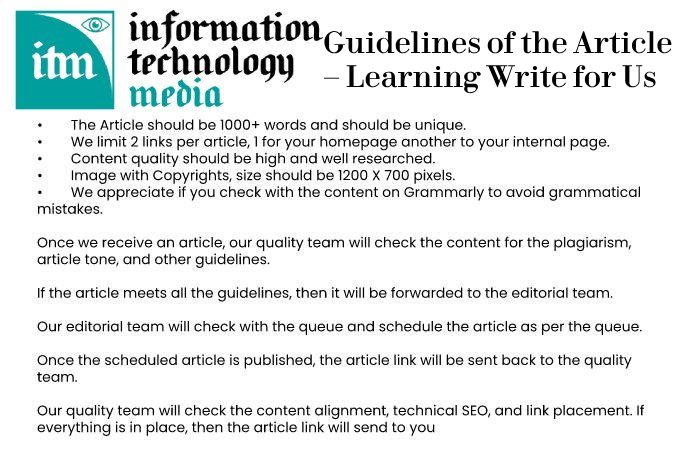Learning to acquire and modify abilities, skills, knowledge, behaviors, and values occur through writing. This is the research, experience, observation, inference, and instruction outcome.
But various learning theories examine this process from various angles. It is one of the most important mental processes in human, animal, and artificial systems.
It depends on several factors, including the workplace environment and the values and principles learned in the family. In addition, the laws of learning are recognized, and the knowledge acquired combines to form the foundation for subsequent learning.
What is learning?
 Learning is merely education and growth for the individual. It seems it must be properly stated and chosen when the individual takes the lead: psychophysiology, the war of nerves, and the study of humans.
Learning is merely education and growth for the individual. It seems it must be properly stated and chosen when the individual takes the lead: psychophysiology, the war of nerves, and the study of humans.
Where each stage of human development is, are the three fields that study how we learn? He creates his high-tech, pure form. Additionally, there are educational strategies for each of them. For instance, teaching and unisex education of children and adults are framed within it.
Additionally, it happens due to the outward changes that experience brings about. Furthermore, although diseases, living patterns, and progress factors are mix in with these changes, they are not governing factors.
Additionally, acquiring a single skill or knowledge is accepted, and an action plan is acceptable. It’s a procedure.
Learning Theories: Classical Training, Operant Exercise and Learning by Observation
Because it encompasses a wide range of sports, the idea of getting to know is fairly comprehensive. The lean philosophy is also seen as a shift in learning in many books.
A prepared collection of concepts known as learning theories explains how individuals acquire, retain, or use newly acquired knowledge. However, learning theories discovered the underlying rationale for describing how record-keeping, processing, and absorption occur throughout learning.
Above all, factors like emotions, positive past experiences, and environmental considerations replace human learning. Therefore, learning theories recommend the best learning structure or method to make the information more potent and compelling.
Many clinicians grew interested in information and the relationship between learning about it from a medical perspective in the early 20th century. However, as a scientific goal, the examination of psychology emphasized the most significant variables that were measurable and obvious.
As a result, environmental factors like increased academies, supervision, and penalties affect the learning process. Therefore, the three main learning models are Operant Training, Social Learning, and Classical Control. Let’s examine the majority of these three fundamental laws of learning.
Classical Training Theory and Learning
However, with the aid of Russian doctors, the fundamental assumptions of classical work on principle were raised. First, a test on dogs used to study their stomach methods revealed the appalling standards of the traditional learning theory.
A very fair comment was made to the Nobel Prize winner in 1904 while he was testing the digestive systems of puppy dogs.
When the lab deputy entered the room carrying a white lab dog, he noticed that his subject might be starting to dry out. Although Pavlov’s discovery was initially accidental, the classical control theory later came to life with the aid of his test.
His Classical Affect Principle was crucial in explaining necessary mental concepts like knowledge and providing inspiration for the behavioral school of thought. The doctor is initially based on two widely held notions:
- Learning takes zone because of the exchange with environmental forces.
- Eco-friendly services play a key role in shaping behavior.
Key Principles of Classical Conditioning Theory
- Purchase
- Death
- Voluntary Recovery
- Boost Generality
- Reason Prejudice
Operant Training Theory and Learning
The true friend of having an effective control concept, however, is great observable clinician B.F. Therefore, effective control is also referred to as trickier Conditioning and helpful Conditioning. The formation of a union is value in useful/effective affect, similar to classical conditioning.
These leagues are, however, divided into ways and school effects. Additionally, the main force in charge of increasing or decreasing the likelihood that the same visible thing will be copied by luck.
However, the reality is that the effect must currently note a sample that can be observed. On open behavioural patterns, operant conditioning is remember.
Key Components of Operant Conditioning
Increase the behavior’s boost or drop as a result of reinforcement. Both Positive and Negative effects could result from this.
Positive reinforcement, also known as successful growth, is the relationship between a positive event or outcome and a behaviour. For instance, a boss might give a bonus for excellent work.
Anti Reinforcement: This is the removal of a negative or hateful event following a final behavioural outcome. By avoiding the unpleasant studies in this instance, the intensity of a reaction is reinforce.
Punishment, on the other hand, aims to lessen the decline in final behavioural outcomes, which may be good or bad.
Positive Punishment: This refers to the application of Punishment through the presentation of an unfavourable event or result in response to a behaviour. A prime example of first-class punishment is getting hit for bad behaviour.
Negative Punishment: This involves taking away a positive outcome or event in response to behaviour that wants to tyre. Therefore, delaying the sale of a worker who can no longer live up to the expectations of the charge may be an example of a fearful punishment.
Planned reinforcements include: Therefore, according to Skinner, the reinforcement schedule with consideration for timing and the prevalence of support determines how quickly new behaviour may be discover.
Key Steps involve in Observational Learning
- Attention
- contol
- Reproduction
- Motivation
How to Submit Your Articles?
To Write for Us, you can email us at contact@informationtechnologymedia.com
Why Write For Information Technology Media – learning Write For Us
 Search Terms Related to Learning Write for Us
Search Terms Related to Learning Write for Us
process
acquiring
understanding
Learnings for Job
knowledge
skill
behavior
Learnings Classrooms
values
preferences
human
accumulate
experience
induce
lifetime
nature
interaction
study
field
activity
Search Terms for Learning Write for Us
We’ve gathered the top ones from the many terms bloggers use to look for learning-related blogs:
guest post
contribute to our site
guest article
submit content
guest post opportunities
this is a guest post by
contributing writer
want to write for
submit blog post
guest poster wanted
accepting guest posts
writers wanted
articles wanted
become an author
Guidelines of the Article – Learning Write for Us
 You can send your article to contact@informationtechnologymedia.com
You can send your article to contact@informationtechnologymedia.com

